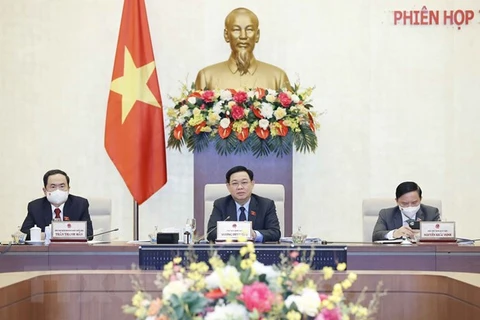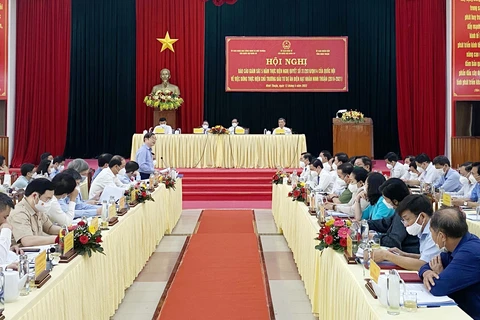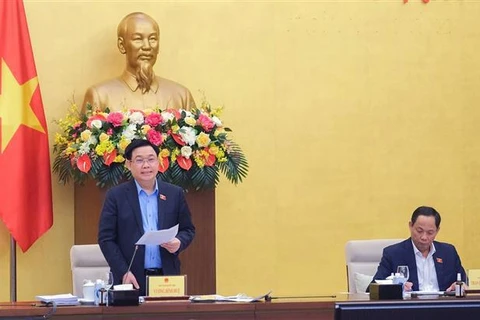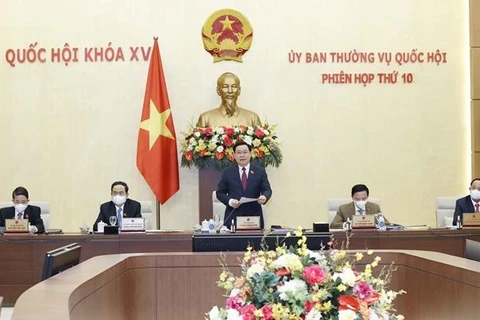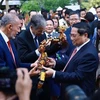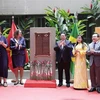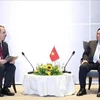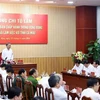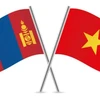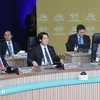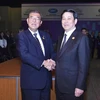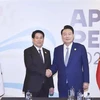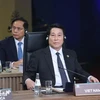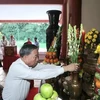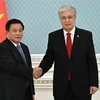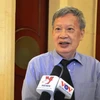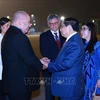Hanoi (VNA) – The National Assembly (NA) Standing Committee on April 18 debated a draft law on amendments and supplements to a number of articles of the Law on Radio Frequencies as part of its 10th session.
Presenting the Government’s proposal on the bill, Deputy Minister of Information and Communications Pham Duc Long said that the law aims to create favourable conditions for the effective mobilisation, distribution and use of radio frequencies and satellite orbits, and ensure that the Law on Radio Frequencies matches relevant international laws and conventions.
The bill supplements two articles of the existing law and makes adjustments to 15 others, Long said.
Representing the verification agency, Chairman of the NA Committee for Science, Technology and Environment Le Quang Huy said that contents of the bill are in line with regulations of the Constitution 2013, ensuring its coherence with relevant international laws and conventions in which Vietnam is a member.
Huy suggested that regulations on the limit of total bandwidth for each organisation/enterprise should be added to the bill to prevent the monopoly, inefficient use, and waste of frequency resources.
However, some members of the NA Standing Committee held that the limitation may affect businesses’ market development activities as well as the rights of consumers.
NA Chairman Vuong Dinh Hue underlined that radio frequencies are national property that have a rising value, especially during the Fourth Industrial Revolution. He stressed the need for strict, open and transparent management of radio frequencies to optimise its values in socio-economic development, security and defence.
Regarding the limit in the total bandwidth that an organisation or business is allowed to use, the NA leader said that it is necessary to clarify the principles and criteria of frequency allocation to ensure equality and transparency, thus encouraging competition and avoiding waste in national resources.
Members of the committee also discussed a number of important issues of the bill, including the method of granting radio frequency use licences, and radio frequency allocation planning and bidding./.
Presenting the Government’s proposal on the bill, Deputy Minister of Information and Communications Pham Duc Long said that the law aims to create favourable conditions for the effective mobilisation, distribution and use of radio frequencies and satellite orbits, and ensure that the Law on Radio Frequencies matches relevant international laws and conventions.
The bill supplements two articles of the existing law and makes adjustments to 15 others, Long said.
Representing the verification agency, Chairman of the NA Committee for Science, Technology and Environment Le Quang Huy said that contents of the bill are in line with regulations of the Constitution 2013, ensuring its coherence with relevant international laws and conventions in which Vietnam is a member.
Huy suggested that regulations on the limit of total bandwidth for each organisation/enterprise should be added to the bill to prevent the monopoly, inefficient use, and waste of frequency resources.
However, some members of the NA Standing Committee held that the limitation may affect businesses’ market development activities as well as the rights of consumers.
NA Chairman Vuong Dinh Hue underlined that radio frequencies are national property that have a rising value, especially during the Fourth Industrial Revolution. He stressed the need for strict, open and transparent management of radio frequencies to optimise its values in socio-economic development, security and defence.
Regarding the limit in the total bandwidth that an organisation or business is allowed to use, the NA leader said that it is necessary to clarify the principles and criteria of frequency allocation to ensure equality and transparency, thus encouraging competition and avoiding waste in national resources.
Members of the committee also discussed a number of important issues of the bill, including the method of granting radio frequency use licences, and radio frequency allocation planning and bidding./.
VNA

